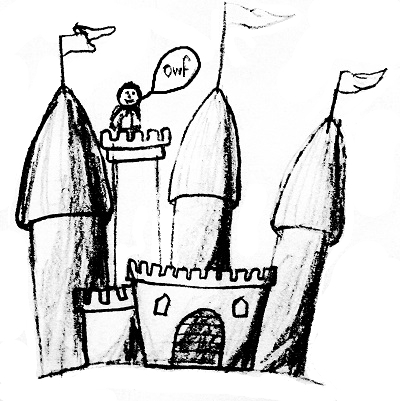As you have noticed, there are lovely girls in Arpa’s land.
People in Arpa's land are numbered from 1 to n. Everyone has exactly one crush, i-th person's crush is person with the number crushi.

Someday Arpa shouted Owf loudly from the top of the palace and a funny game started in Arpa's land. The rules are as follows.
The game consists of rounds. Assume person x wants to start a round, he calls crushx and says: "Oww...wwf" (the letter w is repeatedt times) and cuts off the phone immediately. If t?>?1 then crushx calls crushcrushx and says: "Oww...wwf" (the letter w is repeated t?-?1times) and cuts off the phone immediately. The round continues until some person receives an "Owf" (t?=?1). This person is called theJoon-Joon of the round. There can't be two rounds at the same time.
Mehrdad has an evil plan to make the game more funny, he wants to find smallest t (t?≥?1) such that for each person x, if x starts some round and y becomes the Joon-Joon of the round, then by starting from y, x would become the Joon-Joon of the round. Find such t for Mehrdad if it's possible.
Some strange fact in Arpa's land is that someone can be himself's crush (i.e. crushi?=?i).
The first line of input contains integer n (1?≤?n?≤?100) — the number of people in Arpa's land.
The second line contains n integers, i-th of them is crushi (1?≤?crushi?≤?n) — the number of i-th person's crush.
If there is no t satisfying the condition, print ⑴. Otherwise print such smallest t.
4 2 3 1 4
3
4 4 4 4 4
⑴
4 2 1 4 3
1
In the first sample suppose t?=?3.
If the first person starts some round:
The first person calls the second person and says "Owwwf", then the second person calls the third person and says "Owwf", then the third person calls the first person and says "Owf", so the first person becomes Joon-Joon of the round. So the condition is satisfied if x is1.
The process is similar for the second and the third person.
If the fourth person starts some round:
The fourth person calls himself and says "Owwwf", then he calls himself again and says "Owwf", then he calls himself for another time and says "Owf", so the fourth person becomes Joon-Joon of the round. So the condition is satisfied when x is 4.
In the last example if the first person starts a round, then the second person becomes the Joon-Joon, and vice versa.
Source
Codeforces Round #383 (Div. 2)
My Solution
題意:當(dāng)1個人開始是另外一個人結(jié)束,但這個人開始時前面那個人結(jié)束,具體還是請看題吧,哈哈
dfs+最小公倍數(shù)
每一個人只能且必須處于1個環(huán)中,自環(huán)也是環(huán),如果環(huán)的元素個數(shù)是奇數(shù)則這個環(huán)必須是ansi = k*cnt,如果是偶數(shù)則 ans = k * (cnt / 2);//這個是自己畫圖發(fā)現(xiàn)的規(guī)律。
這題不用多想甚么優(yōu)化的方法,弄復(fù)雜了反而容易錯(比如筆者自己 T _ T ),n <= 100,直接對每個點每層dfs時cnt++,
直到找到 目標(biāo) find(u, v),,或找到根節(jié)點時,或 cnt > 100 時return。//這個100是自己設(shè)定的,即最多100個節(jié)點cnt大于100說明ans = ⑴。
比如
5
2 4 3 1 2
這組數(shù)據(jù)。
找出每一個環(huán)的ansi,然后對這些ansi取最大公約數(shù)便可,a、b最大公約數(shù)等于 a * b / (gcd(a, b)),且注意中間進程溢出,由于這里有 a * b了
復(fù)雜度 O(n^2)
#include <iostream>
#include <cstdio>
#include <cstring>
#include <queue>
using namespace std;
typedef long long LL;
const int maxn = 1e2 + 8;
int cnt;
bool flag[maxn];
queue<int> que;
int father[maxn], _rank[maxn];
inline void DisjointSet(int n)
{
for(int i = 0; i <= n; i++){
father[i] = i;
}
}
inline bool _find(int v, int u)
{
if(father[v] == u){
//cout << cnt << endl;
if(cnt % 2 == 1){
que.push(cnt);
}
else{
que.push(cnt / 2);
}
return true;
}
else if(father[v] == v){
return false;
}
else{
cnt++;
if(cnt == 1024) return false;
if(!_find(father[v], u)){
return false;
}
else return true;
}
}
inline LL gcd(LL a, LL b)
{
return b == 0 ? a : gcd(b, a % b);
}
int main()
{
#ifdef LOCAL
freopen("c.txt", "r", stdin);
//freopen("c.out", "w", stdout);
int T = 4;
while(T--){
#endif // LOCAL
ios::sync_with_stdio(false); cin.tie(0);
int n;
cin >> n;
DisjointSet(n);
for(int i = 1; i <= n; i++){
cin >> father[i];
}
LL ans = 1;
for(int i = 1; i <= n; i++){
cnt = 1;
if(!_find(i, i)){
ans = 1024;
break;
}
}
if(ans != 1024){
ans = que.front();
que.pop();
while(!que.empty()){
ans = (ans * que.front()) / gcd(ans, que.front());
//!WA 61 這里溢出了,換成LL 以后過了, 畢竟求的是最小公倍數(shù)
que.pop();
}
cout << ans << endl;
}
else cout << ⑴ << endl;
#ifdef LOCAL
memset(flag, false, sizeof flag);
cout << endl;
}
#endif // LOCAL
return 0;
}
Thank you!
------from ProLights
